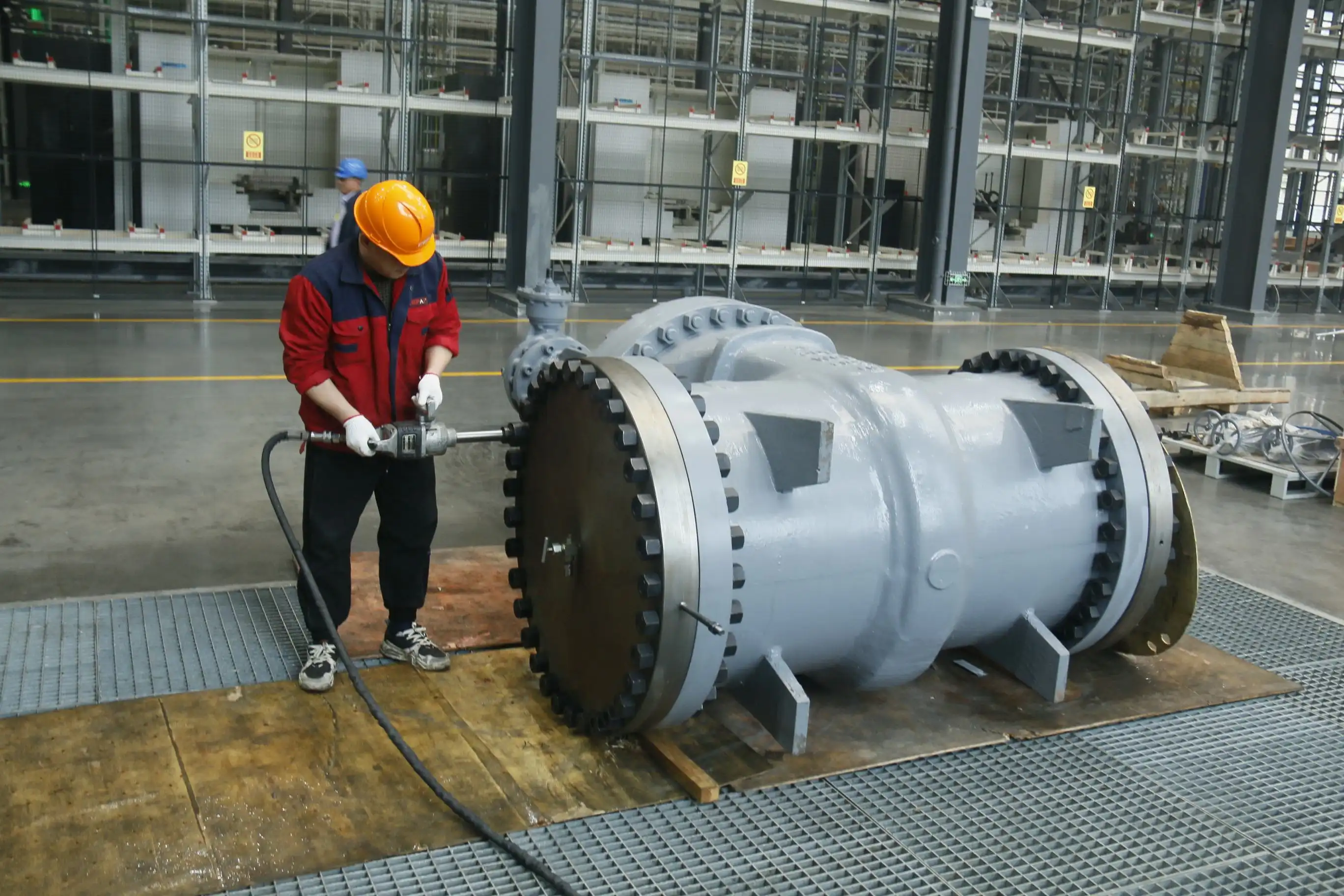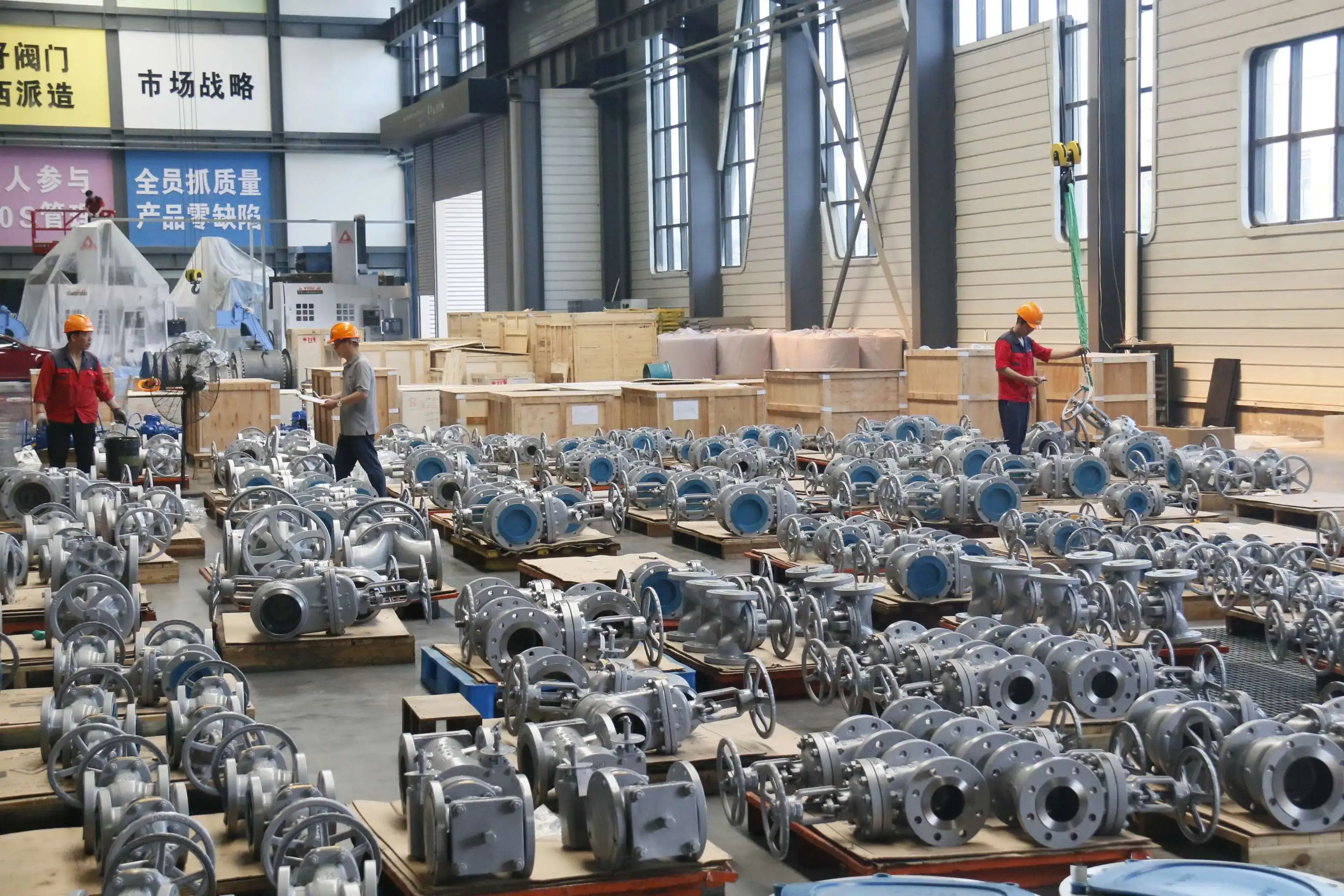Control Valve Solutions for Petrochemical Flow Control Systems
Modern petrochemical facilities require sophisticated flow control systems to manage complex processes involving hazardous chemicals, extreme temperatures, and high-pressure environments. Control valves serve as the critical interface between process control systems and fluid flow, enabling precise regulation of flow rates, pressure levels, and temperature parameters throughout petrochemical operations. These essential components must withstand corrosive media, maintain reliable performance under demanding conditions, and provide accurate flow modulation to ensure operational safety and process efficiency. The selection of appropriate control valve solutions directly impacts production quality, energy consumption, and environmental compliance in petrochemical manufacturing facilities.
Advanced Control Valve Technologies for Petrochemical Applications
High-Performance Globe Control Valves for Process Optimization
Globe control valves represent the cornerstone of precise flow control in petrochemical applications, offering exceptional throttling capabilities and reliable performance under extreme operating conditions. The straight cage type ball valve design from CEPAI Group incorporates advanced engineering principles to handle nominal diameters ranging from DN15-400mm with pressure ratings including PN16, 40, 64, and ANSI150, 300, 600 configurations. These control valves utilize pressure balance spools that eliminate stem forces, reducing actuator requirements and improving control accuracy across varying process conditions. The adjustable characteristics feature both equal percentage and linear flow patterns, allowing engineers to optimize valve performance for specific applications ranging from basic chemical processing to complex polymer production. The valve body construction employs premium materials including WCB, CF8, and CF8M to ensure compatibility with diverse chemical media while maintaining structural integrity under thermal cycling. Extended valve covers designed for temperatures ranging from -40°C to -196°C enable reliable operation in cryogenic applications common in petrochemical facilities. The bolt pressing gland design with flexible graphite and PTFE packing materials provides superior sealing performance, preventing fugitive emissions and maintaining process integrity. Internal components manufactured from 304, 316, and 316L stainless steel with specialized surfacing treatments resist corrosion and erosion, extending service life and reducing maintenance requirements in challenging petrochemical environments.

Electric Actuator Integration for Enhanced Process Control
Electric actuators provide precise positioning and rapid response characteristics essential for modern petrochemical process control systems. CEPAI's electric actuator systems operate on standard industrial voltages of 220V and 380V, accommodating various facility power configurations while maintaining consistent performance across ambient temperatures from -30°C to +70°C. The 4-20mADC control signal integration enables seamless communication with distributed control systems, allowing operators to implement sophisticated control strategies including cascade control, feedforward compensation, and advanced process optimization algorithms. The electric actuator design incorporates robust construction materials and precision manufacturing techniques to deliver reliable positioning accuracy and repeatability under demanding service conditions. Modulating control capabilities enable smooth process transitions while maintaining stable flow characteristics during normal operation and emergency situations. Optional feedback signals provide real-time valve position information to control systems, enabling advanced diagnostics and predictive maintenance strategies. The actuator assembly includes environmental protection features suitable for hazardous area classifications common in petrochemical facilities, ensuring safe operation in potentially explosive atmospheres.
Intelligent Flow Control Systems with Remote Monitoring
Contemporary petrochemical facilities increasingly rely on intelligent flow control systems that integrate advanced control valves with comprehensive monitoring and diagnostic capabilities. CEPAI's remote operation and maintenance service system utilizes augmented reality technology to provide real-time guidance for field personnel, reducing downtime and improving maintenance efficiency. The system architecture supports online monitoring of valve performance parameters, enabling proactive maintenance scheduling and preventing unexpected failures that could disrupt critical production processes. Digital communication protocols facilitate integration with plant-wide asset management systems, providing comprehensive data collection and analysis capabilities. Valve position transmitters, limit switches, and solenoid valves can be configured to meet specific application requirements, creating customized control solutions for unique process conditions. The intelligent system design includes built-in diagnostics that monitor actuator health, valve position accuracy, and control loop performance, alerting operators to potential issues before they impact production. This predictive approach to maintenance and control optimization helps petrochemical facilities achieve higher availability rates and improved process efficiency.
Specialized Materials and Design Features for Harsh Environments
Corrosion-Resistant Materials for Chemical Compatibility
Petrochemical processes involve numerous corrosive chemicals that require specialized materials and protective coatings to ensure long-term valve reliability. CEPAI's control valves utilize advanced metallurgy and surface treatments to resist chemical attack from acids, bases, solvents, and aggressive hydrocarbons commonly encountered in petrochemical operations. The valve trim materials include hardened stainless steel variants with specialized surface treatments that provide enhanced resistance to erosion and corrosion, extending service intervals and reducing lifecycle costs. Material selection for control valve components considers not only chemical compatibility but also temperature cycling effects, mechanical stress concentrations, and galvanic corrosion potential when dissimilar metals are present. The comprehensive material specification process ensures optimal performance across the wide range of chemicals processed in modern petrochemical facilities, from basic commodity chemicals to specialized polymers and high-value intermediates. Quality control procedures include material certification, dimensional verification, and performance testing to validate compliance with international standards and customer specifications.
Temperature Extremes and Thermal Management Solutions
Petrochemical processes often involve extreme temperature conditions that challenge conventional valve materials and designs. CEPAI's low-temperature control valves incorporate specialized designs for applications operating between -60°C to -20°C, utilizing materials and construction techniques that maintain flexibility and sealing integrity under cryogenic conditions. Extended bonnets and insulation systems prevent ice formation and maintain smooth actuator operation during low-temperature service. High-temperature applications require different design approaches, including thermal barrier coatings, heat dissipation features, and material selection optimized for elevated temperature exposure. The valve design incorporates thermal expansion compensation mechanisms that maintain proper sealing and positioning accuracy across wide temperature ranges. Specialized packing materials and gasket compounds are selected based on temperature exposure and chemical compatibility requirements, ensuring reliable sealing performance throughout the specified operating envelope.
Pressure Rating and Safety Considerations
High-pressure applications in petrochemical facilities demand robust valve construction with comprehensive safety features to prevent catastrophic failures. CEPAI's control valves meet stringent pressure vessel codes and safety standards, incorporating design margins that exceed minimum requirements for critical applications. The pressure-balanced valve trim design eliminates unbalanced forces on the closure member, reducing actuator size requirements while improving control stability and safety margins. Safety instrumented system integration capabilities enable control valves to function as part of comprehensive process safety systems, providing emergency shutdown capabilities and fail-safe operation modes. SIL (Safety Integrity Level) certifications for butterfly valves, ball valves, and control valves demonstrate compliance with functional safety standards, enabling their use in safety-critical applications. Regular safety testing protocols and maintenance procedures ensure continued compliance with safety requirements throughout the valve service life.
Application-Specific Solutions and Industry Compliance
Customized Solutions for Diverse Petrochemical Processes

Each petrochemical process presents unique flow control challenges requiring customized valve solutions tailored to specific operating conditions and performance requirements. CEPAI's engineering team collaborates with customers to develop optimized control valve specifications that address particular application needs, from basic flow regulation to complex multi-variable control scenarios. The customization process considers factors including fluid properties, operating conditions, control requirements, and maintenance accessibility to create solutions that optimize both performance and lifecycle costs. Process-specific adaptations may include specialized trim designs for cavitation resistance, noise reduction features for acoustic compliance, and enhanced materials for extended service life in aggressive environments. The valve sizing and selection process utilizes advanced computational fluid dynamics modeling to predict performance characteristics and optimize valve coefficient selections. Custom actuator sizing ensures adequate torque margins while minimizing energy consumption and installation space requirements.
Regulatory Compliance and Quality Assurance
Petrochemical facilities operate under strict regulatory oversight requiring comprehensive documentation and quality assurance programs for all process equipment including control valves. CEPAI maintains extensive quality management systems including ISO 9001 Quality Management certification, environmental management compliance through ISO 14001, and occupational health and safety standards per ISO 45001. These comprehensive quality systems ensure consistent product quality and regulatory compliance across all manufacturing operations. Product certifications include API standards for petroleum industry applications, CE marking for European markets, and specialized SIL certifications for safety-critical applications. Manufacturing quality control procedures include incoming material inspection, in-process verification, and final testing protocols that validate performance specifications before shipment. Comprehensive documentation packages provide traceability and performance verification data required for regulatory compliance and customer acceptance procedures.
Global Supply Chain and Technical Support
International petrochemical operations require reliable global supply chain capabilities and comprehensive technical support services to ensure project success and ongoing operational support. CEPAI has established supplier qualifications with major energy companies including PetroChina, Sinopec, and CNOOC, demonstrating the quality and reliability of their control valve solutions. The company's international market presence enables local support for global projects while maintaining consistent quality standards across all manufacturing locations. Technical support services include pre-sales engineering consultation, application-specific valve selection assistance, installation and commissioning support, and ongoing maintenance guidance. The global service network provides rapid response for emergency situations and planned maintenance activities, minimizing potential production disruptions. Training programs for customer personnel ensure proper installation, operation, and maintenance practices that maximize valve performance and service life.
Conclusion
Control valve solutions for petrochemical flow control systems represent a critical investment in process safety, efficiency, and reliability. The selection of appropriate valve technologies, materials, and support services directly impacts operational performance and lifecycle costs. Advanced control valve designs incorporating intelligent monitoring, specialized materials, and comprehensive safety features enable petrochemical facilities to achieve optimal performance while maintaining regulatory compliance and operational safety. Successful implementation requires careful consideration of application-specific requirements, quality standards, and ongoing support capabilities.
Partner with CEPAI Group Co., Ltd., a leading China Control Valve factory and trusted China Control Valve supplier, to access premium High Quality Control Valves engineered for demanding petrochemical applications. As an established China Control Valve manufacturer, CEPAI offers comprehensive Control Valve wholesale solutions with competitive Control Valve prices and exceptional technical support. Our extensive range of Control Valves for sale includes customized solutions backed by industry-leading certifications and global service capabilities. Contact our technical experts today at cepai@cepai.com to discuss your specific flow control requirements and discover how our advanced valve technologies can optimize your petrochemical operations.
References
1. Smith, R.M. & Johnson, K.L. "Advanced Control Valve Technologies for Chemical Process Industries" - Process Engineering Journal, Volume 45, Issue 3
2. Williams, D.A., Chen, H., & Rodriguez, M.P. "Material Selection and Corrosion Resistance in Petrochemical Valve Applications" - Materials and Corrosion Engineering Quarterly, Volume 28, Issue 2
3. Thompson, J.R., Anderson, S.K., & Liu, W. "Safety Instrumented Systems and Control Valve Integration in Petrochemical Facilities" - Process Safety and Environmental Protection, Volume 156
4. Garcia, L.M., Kumar, P., & Brown, T.J. "Intelligent Flow Control Systems: Applications and Benefits in Modern Petrochemical Plants" - Automation and Control Systems Review, Volume 39, Issue 4
_1745994790767.webp)
Get professional pre-sales technical consultation and valve selection services, customized solution services.

About CEPAI


